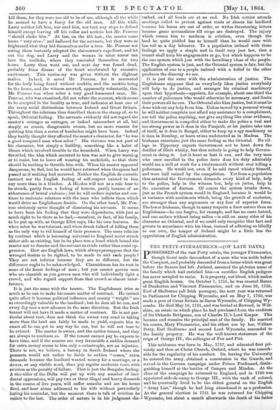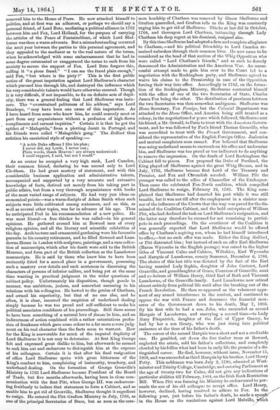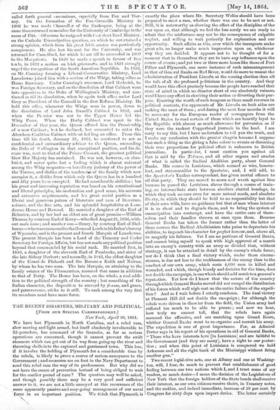THE PETTY-FITZ MAURICES.—(OF LATE DAYS.)
POSSESSED of the vast Petty estate, the younger Fitzmaurice, though lineal male descendant of a man who was noble before the Conquest, and probably descended from a house which was great before the Saxons had left Jutland, assumed the plebeian name of the family which had enriched him—a sacrifice English pedigree has never scrupled to make. It is property, not blood, which makes great English houses. On October 7, 1751, he was created Baron of Dankerton and Viscount Fitzmaurice, and on June 26, 1753, Earl of Shelburne (all Irish peerages), the next year was returned to Parliament for Chipping Wycombe, and on May 7, 1760, was made a peer of Great Britain as Baron Wycombe, of Chipping Wy- combe. He died May 10, 1761, and was buried at Bowood, in Wilt- shire, an estate in which place he had purchased from the creditors of Sir Orlando Bridgman, son of Charles TVs Lord Keeper. This became and remains the principal seat of the family. He married his cousin, Mary Fitzmaurice, and his eldest son by her, William Petty, Earl Shelburne and second Lord Wycombe, succeeded to the family property. He was the well-known statesman of the reign of George Ill., the colleague of Fox and Pitt.
This nobleman was born in May, 1737, and educated first pri- vately and then at Christ Church, Oxford, where he was remark- able for the regularity of his conduct. On leaving the University he entered the army, obtained a commission in the Guards; and served in the German campaign under Prince Ferdinand, distin- guishing himself at the battles of (Dampen and Minden. At the close of the campaign he returned to England, and in 1760 was appointed aide-de-camp to George III., with the rank of colonel, and he eventually lived to be the oldest general on the English "Army List," though he had long abandoned it as a profession. At the general election in 1761 he was returned for Chipping Wycombe, but about a month afterwards the death of his father
removed him to the House of Peers. He now attached himself to polities, and at first was an adherent, or perhaps we should say a personal friend, of Lord Bute, mediating a political alliance in 1762 between him and Fox, Lord Holland, for the purpose of carrying the articles of the Peace of Fontainebleau, of which Lord Shel- burne was then a warm advocate. But a misunderstanding occurred the next year between the parties to this personal agreement, and they appealed to the mediator as to the real nature of the terms, when he acknowledged with some embarrassment that he had in some degree extenuated or exaggerated the terms to each from his anxiety to secure the support of Fox. Lord Bute forgave this, calling it "a pious fraud." "I can see the fraud plain enough," said Fox, "but where is the piety?" This is the first public notice of the great imputation against Lord Shelburne's character which pursued him through life, and destroyed the influence which his very considerable talents would have otherwise ensured. Though it is very difficult, if not impossible, to fix on definite acts of dupli-
city, there was a general feeling that Lord Shelburne was insin- cere. The "overstrained politeness of his address," says Lord Stanhope, "may have been one cause of this imputation. As I have heard from some who knew him, he could scarcely meet or part from any acquaintance without a profusion of high-flown compliments and earnest inquiries." Certain it is that he got the epithet of " Malagrida," from a plotting Jesuit in Portugal, and his friends were called " Malagrida's gang." The Rolled thus satirizes his casuistical style of speaking :— "A noble Duke affirms I like his plan ; I never did, my Lords, I never can ;
Plain words, thank Heaven ! are always understood:
I could support, I said, but not I would."
As an orator he occupied a very high rank, Lord Camden, their common friend, declaring he was second only to Lord Chatham. He had great mastery of statement, and with this considerable business application and administrative talents, accompanied and supported by a very accurate and extensive knowledge of facts, derived not merely from his taking part in public affairs, but from a very thorough acquaintance with books
of the most varied range of subjects. He had very just ideas on economical points—was a warm disciple of Adam Smith when such subjects were little cultivated among statesmen, and on this, as well as several other topics, was far in advance of his age. Thus he anticipated Peel in his recommendation of a new police. He was most liberal—a free .thinker he was called—in his general
opinions. He gathered around him at Bowood men of every religious opinion, and all the literary and scientific celebrities of the day. Architecture and ornamental gardening were his favourite pursuits in his country retirement, and he filled Bowood and Lans- downe House in London with sculpture, paintings, and a rare collec- tion of manuscripts, which after his death were sold to the British Museum, and form part of the British collection as the Lansdowne manuscripts. He is said by those who knew him to have been eminently fitted for a second place in a government, possessing such a mastery over details and such acuteness in discerning the characters of persons of inferior calibre, and being yet at the same time wanting in practical judgment in the wider questions of
cabinet policy. Unfortunately his disposition, though gentle in manner, was ambitious, jealous, and somewhat assuming in his relations with his colleagues. He bowed to the genius of Chatham, and owned his superiority, but that of no one else, and he often, it is clear, incurred the suspicion of underhand dealing simply because he was too proud and self-sufficient to make his political associates confidants of his proceedings. Still there seems to have been something of a natural love of finesse in him, and an indirectness of action combined with a rather ostentatious profes- sion of frankness which gave some colour to a far more severe judg- ment on his real character than the facts seem to warrant. How far the King is answerable for much of the imputed duplicity of Lord Shelburne it is not easy to determine. At first King George felt and expressed great dislike to him, but afterwards he seemed to seek him out and endeavour to distinguish him at the expense of his colleagues. Certain it is that after his final resignation of office Lord Shelburne spoke with great bitterness of the King's conduct to him, complaining of insincerity, treachery, and underhand dealing. On the formation of George Grenville's Ministry in 1763 Lord Shelburne became President of the Board of Trade, but five months afterwards, having been in close com- munication with the first Pitt, when George III, was endeavour- ing fruitlessly to induce that statesman to form a Cabinet, and so enable him to get rid of Grenville, Shelburne thought it expedient to resign. He entered the Pitt-Grafton Ministry in July, 1766, as one of the principal Secretaries of State, but as soon as the com- mon headship of Chatham was removed by illness Shelburne and Grafton quarrelled, and Grafton tells us the King was constantly urging him to get rid of Shelburne. This he at last did in October, 1768, and thereupon Lord Chatham, intimating through Lady Chatham his deep regret at his dismissal, resigned also.
By this time Shelburne had adopted a firm and complete allegiance to Chatham,—and his political friendship to Lord Camden re- mained unbroken through their common lives. He now came to be considered as the head of that section of the Whig Opposition who were called "Lord Chatham's friends," and as such he fiercely denounced the Administration and the American War. An unsuc- cessful attempt made to gain him over to the Court led to a negotiation with the Rockingham party, and Shelburne agreed to waive his claims to the Premiership in case of the Opposition forcing their way into office. Accordingly in 1782, on the forma- tion of the Rockingham Ministry, Shelburne contented himself with the office of one of the two Secretaries of State, Charles James Fox being the other. The distribution of provinces between the two Secretaries was then somewhat ambiguous. Shelburne was Home Secretary, Fox Foreign, but the Colonial Department was attached to the Rome Office, and America being still treated as a colony, in the negotiations for peace which followed, Shelburne sent his friend, a Mr. Oswald, to Paris to treat with the American Govern- ment, and he was followed by Fox's friend Thomas Grenville, who was accredited to treat with the French Government, and con- sidered the representative of the English Foreign Office. Jealousies and mutual complaints soon ensued. Fox believed that Shelburne was using underhand means to encroach on his office and undermine him, and Shelburne was too proud or too indiscreet to do anything to remove the impression. On the death of Lord Rockingham the Cabinet fell to pieces. Fox proposed the Duke of Portland, the King played off Shelburne against the great Whig Houses, and in July, 1782, Shelburne became first Lord of the Treasury and Premier, and Fox and Cavendish seceded. William Pitt the younger was called to the office of Chancellor of the Exchequer. Then came the celebrated Fox-North coalition, which compelled Lord Shelburne to resign, February 24, 1783. The King com- plained that Shelburne had deserted his post while it was still tenable, but it was not till after the employment in a sinister man- ner of the influence of the Crown that the way was paved for the dis- missal of the Coalition Cabinet, and the bold enterprise of William Pitt, who had declined the task on Lord Shelburne's resignation, and the latter may therefore be excused for not remaining to partici- pate in such proceedings. On the overthrow of the Coalition it was generally expected that Lord Shelburne would be offered office by Chatham's aspiring son, whom he had himself introduced to office,—but no such offer was made. Either the King disliked, or Pitt distrusted him ; but instead of such an offer Earl Shelburne (Baron Wycombe in the English peerage) was raised to the higher titles of Viscount Caine and Calston, Wiltshire, Earl Wycombe and Marquis of Lansdowne, county Somerset, December 6, 1784. The choice of this last title was dictated by the fact of the Earl having married Lady Sophia, daughter of John Carteret, Lord Granville, and granddaughter of Grace, Countess of Granville, aunt and co-heiress of William Henry, third Earl of Bath and Viscount Lansdowne, of the Granville family. Lord Lansdowne now retired almost entirely from political life until after the breaking out of the French Revolution. He then re-appeared as the vehement oppo- nent of any armed interference in the contest, and continued to oppose the war with France and denounce the financial mea- sures of the Government down to his death, May 7, 1805. By his first wife he had a son, John, who succeeded as second Marquis of Lansdowne, and marrying a second time—to Lady Mary Fitzpatrick, daughter of the Earl of Upper Ossory, he had by her a son Henry, who was just rising into political eminence at the time of his father's death.
The career of the second Marquis was a short and not a creditable one. He gambled, cut down the fine timber trees at Bowood, neglected the estate, sold his father's collections, and completely clouded by his follies what had been in early life the promise of a dis- tinguished career. He died, however, without issue, November 15, 1809, and was succeeded as third Marquis by his brother, Lord Henry Petty. This nobleman was born July 2, 1780, educated at West- minster and Trinity College, Cambridge, and entering Parliament at the age of twenty-two for Caine, did not give any indications of particular abilities till February, 1804, on the Irish Bank Restriction Bill. When Pitt was forming his Ministry he endeavoured to per- suade the son of his old colleague to accept office. Lord Henry, however, declined, having resolved to adhere to Fox. In the following year, just before his father's death, he made a in the House on the resolutions against Lord Melville, 'di ney. On the formation of the Fox-Grenville Ministry in 1806 he was made Chancellor of the Exchequer, being at the same time returned as member for the University of Cambridge in the room of Pitt: Of course he resigned with Veit short lived Ministry, on the Catholic Emancipation question, on which he entertained a strong opinion, which from his great Irish estates was particularly conspicuous. He also lost his seat for the University, and was returned for Camelford, for which he sat till he succeeded in 1809 to the Marquisate. In 1820 he made a speech in favour of free trale, in 1822 a motion on Irish grievances, and in 1824 strongly urged the recognition of the South American Republics. In 1826, on Mr. Canning forming a Liberal-Conservative Ministry, Lord Lansdowne joined him with a section of the Whigs, taking office as Home Secretary. Under Canning's successor, Lord Goderich, he was Foreign Secretary, and on the dissolution of that Cabinet went into opposition to the Duke of Wellington's Ministry, and con- tinued so till its dissolution, when he again took office under Lord Grey as President of the Council in the first Reform Ministry. He held this Office, whenever the Whigs were in power, down to the dissolution of Lord John Russell's Cabinet in 1832, and when the Premier was not in the Upper House led the Whig Peers. When the Derby Cabinet was upset in the December of that year, the Queen offered him the Premiership of a new Cabinet ; but he declined, but consented to enter the Aberdeen-Coalition Cabinet without holling an office. From this time till his death, January 31, 1863, he continued to act as confidential and extraordinary adviser to the Queen, succeeding the Duke of 11 ellington in that exceptional position, and his de- cease was, next to that of the Prince Consort, the greatest political blow Her Majesty has sustained. Ile was not, however, an abso- lutist, and never quite lost a feeling which is almost universal among the Whig magnates—a hereditary jealousy of the power of the Throne, and dislike of the tendencies of the family which now occupies it, a dislike from which only the Queen has in a hundred and fifty years been excepted. He had considerable abilities ; but his great and increasing reputation was based on his constitutional and liberal principles, his moderation and good sense, his accurate and extensive acquirements, and his great social position as a liberal and generous patron of literature and men of literature, science, and the fine arts, and his splendid hospitalities at Lans- downe House and Bowood. He married a daughter of the Earl of Ilchester, and by her had an eldest son of great promise—William Thomas, by courtesy Earl of Kerry—who died August 21, 1836, with- out male issue ; and another son—Henry, by courtesy Earl of Shel- burne—who was summoned to the House of Lord.s in his father's barony of Wycombe, and is the present and fourth Marquis of Lansdowne. The present Marquis has been a Lord of the Treasury aud Under Secretary for Foreign Affairs, but has not made any political position beyond that commanded by his social rank. He married first, in 1840, a daughter of the eleventh Earl of Pembroke, and sister of the late Sidney Herbert; and secondly, in 1843, the eldest daughter of the Count de Flahault and the Baroness Keith and Nairne, by whom he has two sons. The late Marquis, on attaining to the family estates of the Fitzmaurices, resumed that name in addition to that of Petty. The House has been, on the whole, a real addi- tion to the political strength of the country ; but something of the Italian character, the disposition to succeed by finesse, and grace, and perseverance, sticks to it still. To rank among the very first its members must have more force.
































 Previous page
Previous page